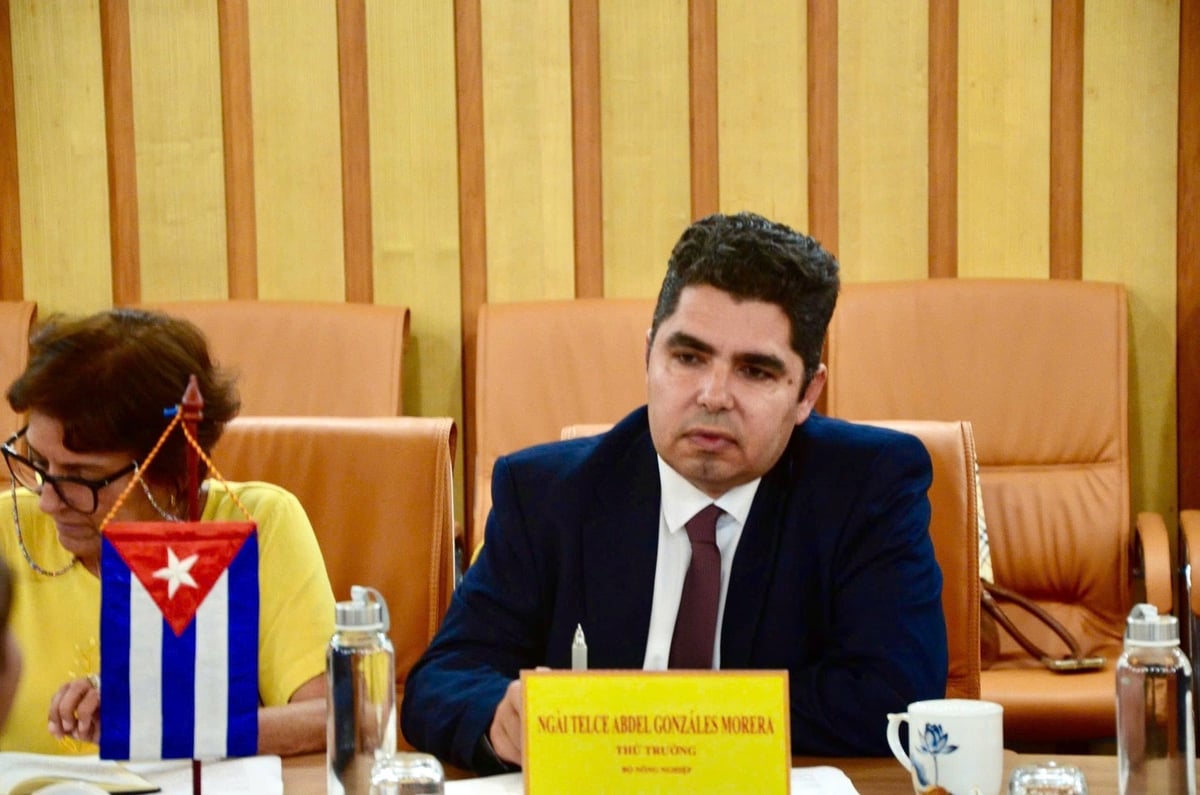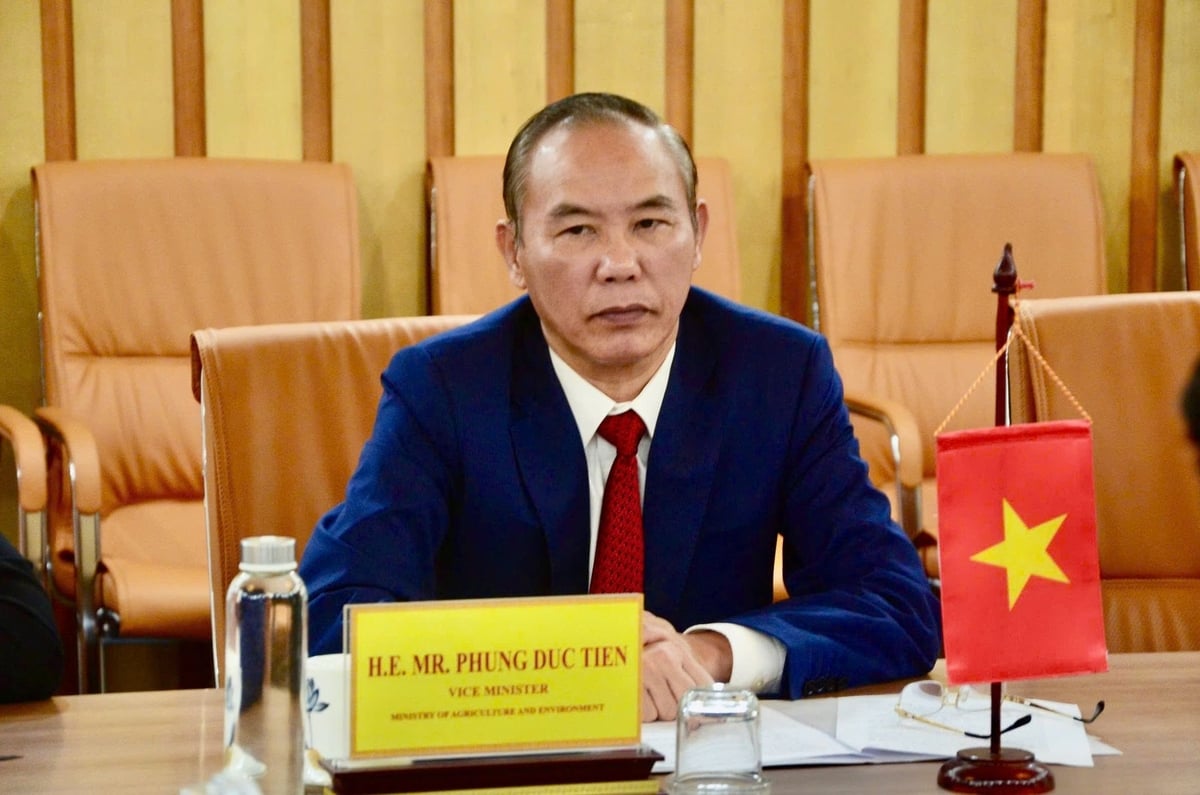December 6, 2025 | 03:23 GMT +7
December 6, 2025 | 03:23 GMT +7
Hotline: 0913.378.918
December 6, 2025 | 03:23 GMT +7
Hotline: 0913.378.918
On the afternoon of August 25 in Hanoi, Deputy Minister of Agriculture and Environment Phung Duc Tien had a working session with Deputy Minister of Agriculture of Cuba Telce González Morera to review the results of cooperation and discuss solutions to boost rice production as well as various agricultural fields in the coming period.
At the meeting, Deputy Minister Telce González Morera highly appreciated Vietnam’s support in recent years in terms of resources, technology, and technical cooperation. Thanks to favorable conditions and the companionship of Vietnamese experts, Cuba’s rice production targets in phases 3 and 4 achieved positive results. As phase 5 concluded and new forms of cooperation opened, the Deputy Minister called for businesses to invest and cooperate in agricultural production in Cuba.

Deputy Minister of Agriculture of Cuba, Telce González Morera, discusses the orientation of agricultural cooperation between the two countries. Photo: Hong Ngoc.
Deputy Minister Telce noted that Vietnamese enterprises are currently piloting more than 1,000 hectares of rice and planning to expand the cultivated area to 2,500 - 3,000 hectares with the direct participation of Cuban farmers. This is the second cooperation model, following the first model in which Vietnamese enterprises managed the entire process. In addition, the two sides are exploring a third model, whereby Vietnamese enterprises will supply agricultural materials for Cuban farmers to take initiative in production. These models are expected to lay the foundation for large-scale rice production in Cuba.
Cuba hopes that with the pioneering role of these enterprises, large-scale rice production linkages will be formed, thereby opening greater opportunities for Vietnamese businesses to invest in the Cuban market.
Deputy Minister Phung Duc Tien affirmed that Vietnam highly values the results of cooperation in recent years and is committed to continuing close coordination with Cuba in rice, fisheries, and maize processing. “Vietnam once experienced a difficult period in terms of food security, so we fully understand the importance of securing supply autonomy. In 2024, rice output reached 43.5 million tons, with exports of 4.15 million tons. This year’s production is projected to reach 47 million tons. Exports of agriculture, forestry, and fisheries amounted to USD 62.5 billion, with a trade surplus of USD 11.52 billion in the first seven months of 2025. These are experiences we are willing to share with Cuba so that we may grow together,” the Deputy Minister emphasized.

Deputy Minister of Agriculture and Environment, Phung Duc Tien, at the working session with the Cuban delegation on the afternoon of August 25. Photo: Hong Ngoc.
He added that the two sides will meet again on September 14 to discuss the direction of future cooperation and to facilitate business engagement. “I am confident that Vietnam - Cuba cooperation in agriculture will achieve even greater success,” Deputy Minister Phung Duc Tien stated.
This meeting took place in the context of Vietnam’s celebration of the 80th anniversary of National Day on September 2. The Cuban delegation expressed the hope that this mission would yield tangible results and open a new phase of cooperation in rice production, thereby contributing to food security for both countries.
Translated by Hong Ngoc

(VAN) As of 2025, the ASEAN region has a total of 69 ASEAN Heritage Parks recognized across its 10 member states. Among them, Viet Nam contributes 15 ASEAN Heritage Parks.

(VAN) Yok Don National Park has high biodiversity with numerous endemic plant and animal species, and it is also the only dipterocarp forest ecosystem conservation area in Viet Nam.

(VAN) Viet Nam and Brunei signed two important MOUs on fisheries and IUU, expanding cooperation in agriculture, the environment, and Halal exports, aiming to substantively implement joint projects.

(VAN) The Viet Nam Coconut Association worked with the International Finance Corporation (IFC) and businesses to promote the supply chain, enhance competitiveness, and develop the coconut industry sustainably.
![Hue aims for Net Zero: [2] Pioneering low-emission tourism](https://t.ex-cdn.com/nongnghiepmoitruong.vn/608w/files/huytd/2025/12/04/0633-dulichzero-4-095634_236-161125.jpg)
(VAN) The ancient capital of Hue has developed Net Zero tourism products and models, aiming to reduce carbon emissions and pioneer the establishment of Viet Nam's green tourism destination.

(VAN) C.P. Viet Nam has announced the successful completion of its goal to plant 1.5 million trees during the 2021-2025 period, a key milestone within company's long-term ESG strategy and its roadmap for emission reduction.

(VAN) This is an initiative of MAE aimed at creating a unified coordination mechanism to implement agricultural cooperation programs with developing countries.